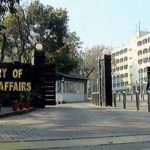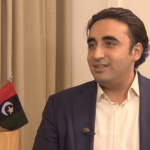WASHINGTON, Aug 18 (APP): Pakistan’s Ambassador to the United States, Asad Majeed Khan, has said that Taliban’s takeover of Afghanistan has provided an opportunity for Washington and Islamabad to work in concert rather than in an atmosphere of suspicion over the alleged Pakistani support for the insurgents.
In an interview with Foreign Policy, a prestigious American magazine, he said he believes there is now a “convergence” of interests among Pakistan, the United States, China, and Russia in preventing the export of terrorism.
“Really, I think the good thing today is that regarding Afghanistan, there is a complete convergence between the United States and Pakistan, the Pakistani envoy said, adding that US Secretary of State Antony Blinken and Pakistani Foreign had long conversation on the situation in Afghanistan,
“You want the parties (in Afghanistan) to get to a common understanding. We want that. You want the violence reduced. We want that. You want the gains of the past preserved. We want that. … China and Russia are concerned too [about terrorism]. We are all worried.”
Ambassador Khan also said that, contrary to reports of Taliban brutality and atrocities, the Taliban “seem to be listening to the counsel of the international community,” referring to the group’s declaration of general amnesty and vow to form an inclusive government.
Responding to a series of questions about Pakistan’s connections with the Taliban, Ambassador Khan said that Pakistan has long been for the defunct Afghan government an afterthought and excuse and a diversion to cover up for their deficiencies. “Unfortunately,” he added, “it suited the political convenience of the United States also. … (but) We have supported the peace process completely, and we will continue to do that.
Further asked if all the Taliban leadership was out of Pakistan, Ambassador Khan said, “I only know the leadership has moved from Doha to Afghanistan”.
Asked about Pakistan’s main sources of concern now, he said, “We would like to see an inclusive government, and that was something we hoped would come out of an inclusive peace process.
“These developments have clearly been a setback. So we are doing whatever we can, and the extended “troika” [the United States, Pakistan, China, and Russia] had a good meeting in Doha on Aug. 10 and Aug. 11. We are engaged with these key players to have all the ethnicities of Afghanistan represented. The diversity of Afghanistan also needs to be reflected in the composition of the government.”
When asked about hopes for achieving that, the Pakistani envoy said, “What we are hearing from the ground and what we are seeing in terms of developments is the Taliban seem to be listening to the counsel of the international community.
“There haven’t been very many violent incidents. Some schools have been opened. One of their leaders was interviewed by a female anchor”.
Asked whether Pakistan would help on intelligence and other things to support the U.S. posture of maintaining over-the-horizon vigilance against al Qaeda, the Islamic State, and other terrorists, he said, “The bottom line is terrorism is our concern as much as it is your concern. And there are ways in which we can and will cooperate with the international community and the United States. We have cooperated in the past.”
Replying to a question about India’s “aggressive” posture towards Pakistan, Ambassador Khan said, “Unfortunately, Afghan territory has been used against us. Even this so-called Sanction Pakistan campaign—basically, a lot of it originated from India. It’s sad. … So therefore, Afghanistan will have to sort this one out.”
India, he said, had closed its embassy in Kabul.
“We have made overtures for engagement, but Prime Minister (Narendra) Modi, the problem really is that his politics somehow puts Pakistan in the domestic political scene and context and … it suits him to maintain a hard line on Pakistan, and that’s what he’s continuing to do.
“And Kashmir is another place where he has taken a unilateral action. … So Modi is not conceding anything, and the stalemate continues,” the Pakistani envoy added.







